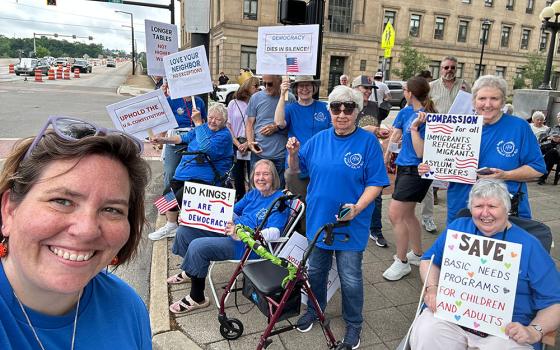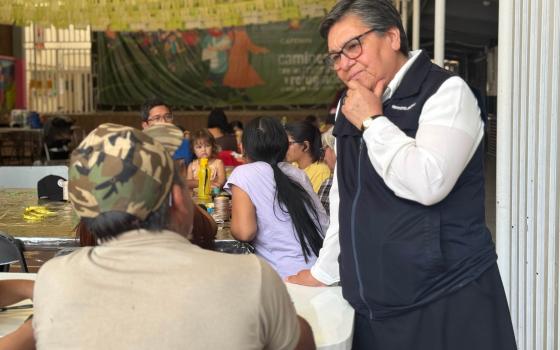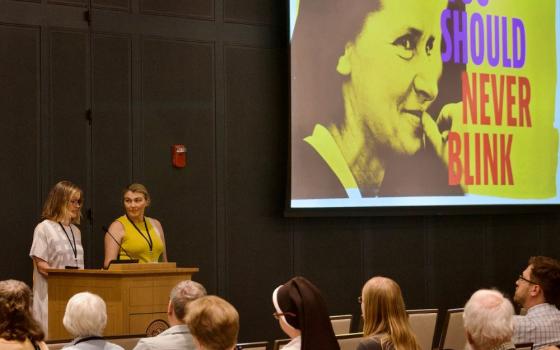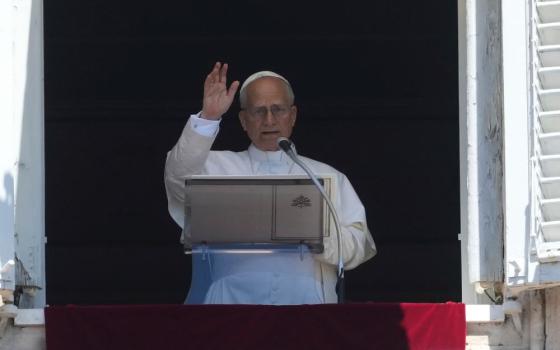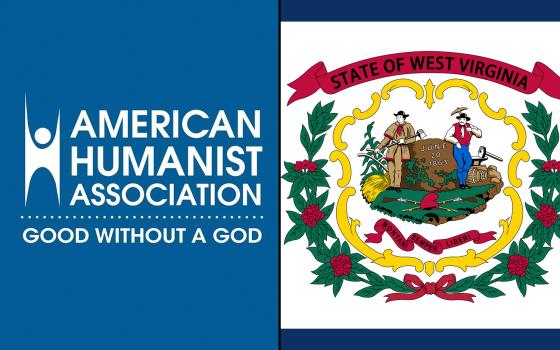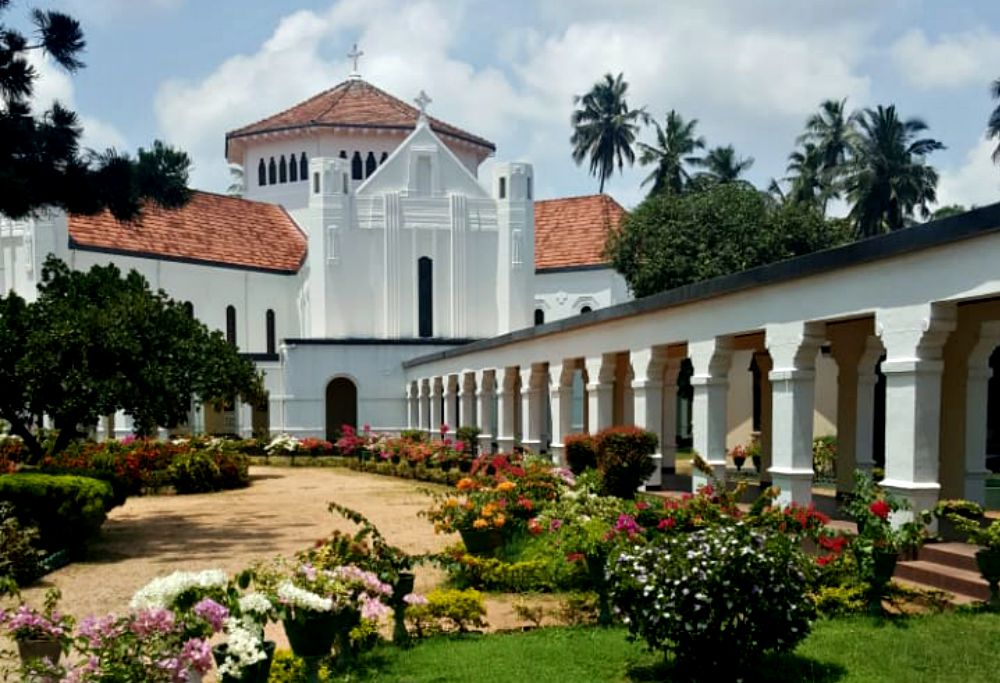
The Good Shepherd institutions at Nayakakanda, on the outskirts of the Sri Lankan capital of Colombo (Thomas Scaria)
The Good Shepherd sisters in Sri Lanka have been taking care of widows and orphans from the island nation's civil war for 26 years. For their 150 years in Sri Lanka after coming from Ireland, their charism has always been to tend to women and children.

Sr. Francine Muthugala, provincial of the Sri Lanka-Pakistan province of the Sisters of Our Lady of Charity of the Good Shepherd (Thomas Scaria)
So, it came naturally for them to find a way to rush to the aid of the children left bereft after the Easter bombings in Sri Lanka in April. They decided to take the money set aside for their 150th jubilee celebration and turn it to scholarships for the children.
"We canceled our celebrations and decided to use the money as scholarships for children affected by the bomb blasts," Sr. Francine Muthugala, the provincial of the Our Lady of Charity of the Good Shepherd congregation, told Global Sisters Report. The province covers Sri Lanka and Pakistan.
The congregation had planned a variety of programs for their sesquicentennial jubilee on May 18, but limited the celebrations to a prayer meeting in their communities. On their special day, the provincial announced that they would disburse the money saved as scholarships for children who survived the blasts. (The sisters declined to reveal the details of the donation they made.)
At least 250 people, mostly Catholics, died in the series of blasts that on April 21, Easter Sunday, hit three churches and three luxury hotels in three parts of Sri Lanka, including Colombo, the capital.
Muthugala says the blasts have added to the number of orphans in Sri Lanka, already expanded from the civil war and a tsunami.
Advertisement
The 1983-2009 civil war, triggered by the minority Tamils' demand for a separate state and opposed by the majority Sinhalese, left up to 100,000 people dead.
The December 2004 tsunami killed more than 35,000 people. The epidemics that followed also killed hundreds.
"Our main activity in the country was to care for women and children victimized by such situations," Muthugala told Global Sisters Report at the Good Shepherd campus in Nayakakanda (which in Sinhalese means "Leader of the Mountain), on the northern outskirts of Colombo.

Sr. Rosary Perera, superior of the welfare institutions on the Good Shepherd campus, in Nayakakanda on the northern outskirts of Colombo, the Sri Lankan capital (Thomas Scaria)
Besides the sisters' provincial house, the campus holds a center for children, a home for the unwed mothers, a vocational training center for young women with more than 250 residents, and a house for their contemplative members.
The congregation now has 375 members in 72 convents spread over 11 dioceses in Sri Lanka and four dioceses in Pakistan. The first convent in Pakistan was opened in 1976 by four Good Shepherd nuns from Sri Lanka at Fatimapur, a poor village in the Multan Diocese. Now, the congregation has six convents in Pakistan with 18 nuns, 14 of them natives.
Globally, the congregation has more than 3,000 members serving in 72 countries.
The provincial says her sisters in Sri Lanka now care for a total of 800 children in their 17 child care centers, 730 women and 70 men at one detention home and a safe home. Most are referred to them by the government probation and child care centers.
"Today, as we commemorate the 150th year of our presence in Sri Lanka, these women and children are our assets, our motivation, and our success stories," the provincial said.
But the congregation is slowly shifting from institution-based care to community-based approaches to address the problem.
"A significant jubilee project is the community-based attention to children," Muthugala said, adding that they no longer call their centers "orphanages or women shelter homes" but centers of transition.
The community-based child protection programs the sisters had started on an experimental basis will continue as "our new approach," the provincial explained.
Sr. Rosary Perera, superior of the Euphrasia community that manages the institutions in the Nayakakanda campus, says most residents had "joined us as abandoned children."
"We are trying to reduce the intake for institutional care," said Perera, who, however, hinted that the shift will be slow as "we have several children growing up with us."
The nuns provide them education, skills training and leadership formation before settling them in life with a job or marriage, said Perera, who has spent much of her religious life for the socioeconomic rehabilitation of the women and children in their institutions.
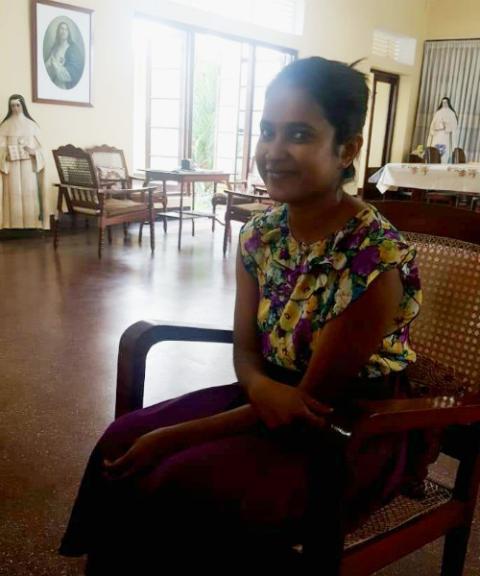
Geeshani Nipulika, receptionist of the Good Shepherd Institutions in Nayakakanda, was handed over to the sisters by a government probation and child care center in 2005. (Thomas Scaria)
Perera showed the GSR reporter around the centers on the campus.
Geeshani Nipulika, 22, the receptionist, and her friend Clara Hilda David, who teaches at the nuns' Montessori school, joined the tour. The two women are survivors of the civil war and were cared for by the nuns.
David, 31, came to the Nayakakanda campus as a 4-year-old orphan when her parents died in the civil war.
Nipulika, who was brought here when she was 7, says all she remembers are dark nights. "Today, we are happy and confident of building up a good life," Nipulika told GSR.
Perera, wrapping her hands around David, says her latest responsibility is "to look for a good husband for this girl."
The group visited the children's home first. The children looked cheerful and were busy doing their homework.
Perera said the children attend a government-run school adjacent to the convent, where the principal is a Good Shepherd nun. The children, aged 4-18, study in various grades. The school had belonged to the congregation before the Sri Lankan government nationalized all educational institutions in the country in the 1960s.
She said the nuns continue to play a "good shepherd role" in calamities hitting their small nation. The blasts, the latest, targeted mainly Christians attending the Easter Sunday Mass.
* Sr. Madonna Wimaladasa, who was part of the first community-based child protection program in five villages in the tea plantation areas, said the experiment proved "more effective and less stigmatized."
Wimaladasa, who researched community-based approaches, said the experiment was in accordance with the principles of the United Nations Convention on the Rights of the Child. She had presented the concept and findings of the Sri Lanka experiment at an international conference in Rome in May.
The program is "based on a child's basic rights for nondiscrimination, right to life, survival and development and participation," she explained.
The program aims at creating a child-friendly and safe space in their family and community to help children grow healthily.
"Child, family and community become our three major focus areas," Wimaladasa said.
The program, experimented with in northern districts affected by the civil war, has so far covered 1,045 children, 693 women and 390 men in the past two years. "We hope to reach out to more children and families and in the process reduce our intake for institutional care," Wimaladasa said.
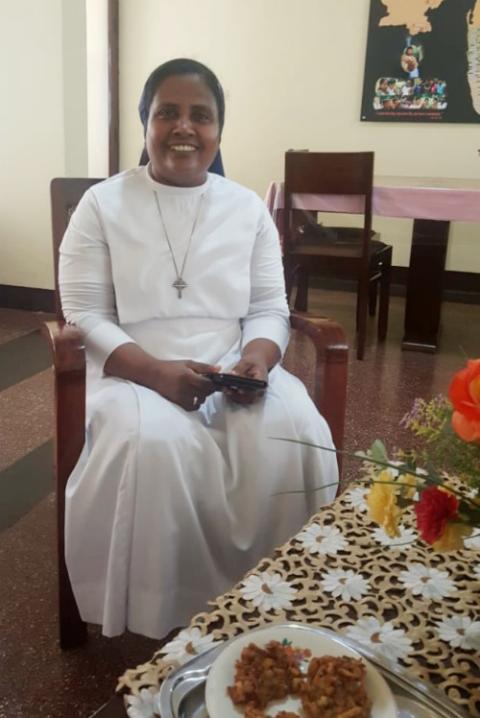
Sr. Niluka Perera heads the Justice and Peace Commission of the Good Shepherd Sisters of Sri Lanka. (Thomas Scaria)
Sr. Niluka Perera, (Perera is a common surname among Sri Lankan Catholics), who heads the congregation's Justice and Peace Commission, says her focus is on reconciling Tamils and Sinhalese. Both the communities have lost thousands in the civil war.
"While several cases are pending under international courts on human rights violations, we concentrate on bridging the gap between the two communities," said Niluka, who brought together students and women from the two communities for camps at the Good Shepherd institutions.
"The living together experience has helped them understand each other better. We focused especially on children as we wanted our new generation to grow up without prejudices," explained Niluka, who also reports to the U.N. Commission on Justice and Peace.
The provincial says their congregation has witnessed various milestones in Sri Lanka's history. Empowerment of women and girls, economic justice, migration, anti-trafficking, and ecology have been their priorities, she adds.
The congregation, founded in 1835 by St. Mary Euphrasia Pelletier in Angers, France, sent four Irish sisters to Sri Lanka 34 years later. The country was then known as Ceylon and was a British colony.
Benedictine Bishop Hilarion Sillani of Colombo, an Italian, had invited them to open a convent at Kotahena, a slum near the St. Lucia's Cathedral. Two pioneer sisters died of illness, the provincial said, referring to their records.
Until 1929, the congregation focused only on schools and orphanages. After setting up the provincial house in Nayakakanda in 1955, it started working among unwed mothers, the provincial said.
During British rule (1815-1948), most Good Shepherd nuns in Sri Lanka were from Ireland. So, when the Sri Lankan government stopped issuing visas to foreign missionaries in 1957, the congregation was left with just three native professed members and 117 Irish sisters already there on visas.
The government crisis over the foreign sisters was overcome by merging a local, diocesan congregation under the Colombo archbishop, Sisters of St. Francis Xavier, with the Good Shepherd congregation on March 13, 1957. The local congregation had 445 professed sisters, 41 novices and 18 postulants, who joined the Good Shepherd congregation's 120 members.
[Thomas Scaria is a senior journalist based in India who has worked in Sri Lanka until recently in an intergovernmental organization. He has written for UCA News since 1991 and received its 2000 Best Reporter award. He also writes for Matters India, a news portal that focuses on religious and social issues and collaborates with GSR.]
* This article has been edited to remove a photo incorrectly identified as Sr. Madonna Wimaladasa.

